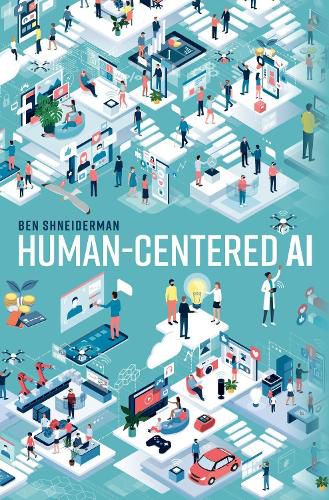Readings Newsletter
Become a Readings Member to make your shopping experience even easier.
Sign in or sign up for free!
You’re not far away from qualifying for FREE standard shipping within Australia
You’ve qualified for FREE standard shipping within Australia
The cart is loading…






A HUMAN-CENTERED APPROACH TO ARTIFICIAL INTELLIGENCE WILL ENSURE HUMAN CONTROL OVER POWERFUL AND HELPFUL FUTURE MOBILE DEVICES AND SERVICESResearchers, developers, business leaders, policy makers, and others are expanding the technology-centered scope of artificial intelligence (AI) to include human-centered AI (HCAI) ways of thinking. This expansion from an algorithm-focused view to embrace a human-centered perspective can shape the future of technology to better serve human needs.The remarkable progress in algorithms for machine and deep learning have opened the doors to new opportunities, and some dark possibilities. However, as many technology companies and thought leaders have said, the goal is not to replace people, but to empower them by making design choices that give humans control over technology.In Human-Centered AI, Professor Ben Shneiderman aims to produce an optimistic, realistic, guide to how artificial intelligence can be used to augment and enhance humans' lives. This project bridges the gap between ethical considerations and practical realities to make successful, reliable systems. Digital cameras, communications services, and navigation apps are just the beginning. Shneiderman shows how future applications will support health and wellness, improve education, accelerate business, and connect people in reliable, safe, and trustworthy ways that respect human values, rights, justice, and dignity.FeaturesFocuses not on the risks of AI, but on the opportunities it presents and how to capitalise on themPuts forward 15 recommendations about how programmers, business leaders, educators, professionals, and policy makers can implement human centered AIExplains how an expansion from an algorithm-focused view to embrace a human-centered perspective can shape the future of technology so as to better serve human needsBridges the gap between ethical considerations and practical realities to make successful, reliable systemsNew to this EditionPreface by the author
$9.00 standard shipping within Australia
FREE standard shipping within Australia for orders over $100.00
Express & International shipping calculated at checkout
A HUMAN-CENTERED APPROACH TO ARTIFICIAL INTELLIGENCE WILL ENSURE HUMAN CONTROL OVER POWERFUL AND HELPFUL FUTURE MOBILE DEVICES AND SERVICESResearchers, developers, business leaders, policy makers, and others are expanding the technology-centered scope of artificial intelligence (AI) to include human-centered AI (HCAI) ways of thinking. This expansion from an algorithm-focused view to embrace a human-centered perspective can shape the future of technology to better serve human needs.The remarkable progress in algorithms for machine and deep learning have opened the doors to new opportunities, and some dark possibilities. However, as many technology companies and thought leaders have said, the goal is not to replace people, but to empower them by making design choices that give humans control over technology.In Human-Centered AI, Professor Ben Shneiderman aims to produce an optimistic, realistic, guide to how artificial intelligence can be used to augment and enhance humans' lives. This project bridges the gap between ethical considerations and practical realities to make successful, reliable systems. Digital cameras, communications services, and navigation apps are just the beginning. Shneiderman shows how future applications will support health and wellness, improve education, accelerate business, and connect people in reliable, safe, and trustworthy ways that respect human values, rights, justice, and dignity.FeaturesFocuses not on the risks of AI, but on the opportunities it presents and how to capitalise on themPuts forward 15 recommendations about how programmers, business leaders, educators, professionals, and policy makers can implement human centered AIExplains how an expansion from an algorithm-focused view to embrace a human-centered perspective can shape the future of technology so as to better serve human needsBridges the gap between ethical considerations and practical realities to make successful, reliable systemsNew to this EditionPreface by the author